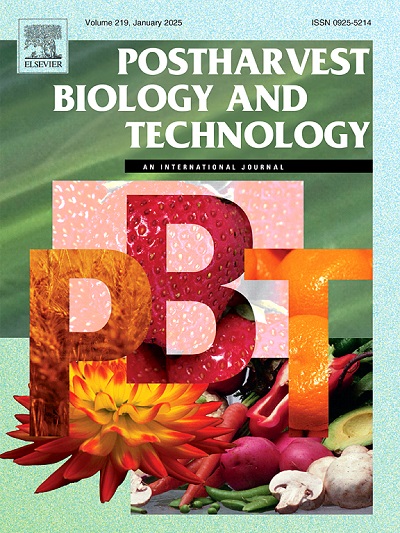SlIMP3的过表达调节糖代谢、抗氧化活性和果实软化,从而延长番茄果实的保质期
IF 6.8
1区 农林科学
Q1 AGRONOMY
引用次数: 0
摘要
番茄果实在采后贮藏过程中,常因失水或受病原菌感染而萎缩甚至腐烂,给番茄果业造成重大经济损失。肌醇单磷酸酶(IMP)参与肌醇的合成,作为细胞壁多糖合成的前体,也参与抗坏血酸的合成。在番茄中,slip3的过表达已被证明会延迟果实软化,但slip3调节果实软化的机制尚不清楚。本研究对野生型番茄果实(WT)和过表达SlIMP3的番茄果实在贮藏0、15和26 d时的转录组和代谢组进行了全面分析。共鉴定出83种差异代谢物,2000多个基因在贮藏和SlIMP3-OE番茄果实中表现出变化。KEGG通路富集分析显示,差异基因主要与代谢途径和次生代谢物的生物合成有关。代谢组学分析表明,在贮藏过程中,各种糖类(莱素、葡萄糖、纤维素二糖、allulose等)和抗氧化剂(褪黑素、3,4-二羟基扁桃酸、二氢槲皮素、水杨酸)发生了显著变化。值得注意的是,与野生型相比,大多数与细胞壁降解相关的基因(SlEXP1、SlPL、SlPG2、SlTBG4、SlXYL1、SlXTH5)在SlIMP3-OE中下调。双组学分析表明,过表达SlIMP3调控了番茄果实贮藏过程中多种碳水化合物和抗氧化剂的积累以及相关合成代谢基因的表达。综上所述,SlIMP3的过表达通过调节碳水化合物和抗氧化代谢影响番茄果实软化,同时调节细胞壁代谢相关基因的表达。该研究为提高果实品质和减少采后损失提供了新的理论见解和可能的方法。本文章由计算机程序翻译,如有差异,请以英文原文为准。
Overexpression of SlIMP3 regulates sugar metabolism, antioxidant activity, and fruit softening, leading to extended shelf life of tomato fruits
During the postharvest storage of tomato fruits, they often shrink or even rot due to water loss or infection by pathogenic bacteria, leading to significant economic losses in the tomato fruit industry. Inositol monophosphatase (IMP) is involved in inositol synthesis, which serves as a precursor for the synthesis of cell wall polysaccharides and is also involved in ascorbic acid synthesis. Overexpression of SlIMP3 in tomato has been shown to delay fruit softening, but the mechanism by which SlIMP3 regulates fruit softening remains unclear. In this study, the transcriptome and metabolome of wild-type tomato fruit (WT) and SlIMP3 overexpressing tomato fruit were thoroughly analyzed at 0, 15 and 26 days of storage. A total of 83 differential metabolites were identified, and more than 2000 genes exhibited changes during storage and in SlIMP3-OE tomato fruits. KEGG pathway enrichment analysis revealed that the differential genes were mainly related to metabolic pathways and the biosynthesis of secondary metabolites. Metabolome analysis showed that various sugars (lythreon, glucose, cellobiose, allulose, etc.) and antioxidants (melatonin, 3,4-dihydroxymandelic acid, dihydroquercetin, salicylic acid) underwent significant changes during storage. Significantly, most genes associated with cell wall degradation (SlEXP1, SlPL, SlPG2, SlTBG4, SlXYL1, SlXTH5) were downregulated in SlIMP3-OE compared to the wild type. Two-omics analysis indicated that overexpression of SlIMP3 regulated the accumulation of many carbohydrates and antioxidants and the expression of related anabolic genes during storage of tomato fruits. In conclusion, overexpression of SlIMP3 affects tomato fruit softening through the modulation of carbohydrate and antioxidant metabolism, concurrently regulating the expression of genes associated with cell wall metabolism. This study provides new theoretical insights and potential methods for improving fruit quality and reducing postharvest loss.
求助全文
通过发布文献求助,成功后即可免费获取论文全文。
去求助
来源期刊

Postharvest Biology and Technology
农林科学-农艺学
CiteScore
12.00
自引率
11.40%
发文量
309
审稿时长
38 days
期刊介绍:
The journal is devoted exclusively to the publication of original papers, review articles and frontiers articles on biological and technological postharvest research. This includes the areas of postharvest storage, treatments and underpinning mechanisms, quality evaluation, packaging, handling and distribution of fresh horticultural crops including fruit, vegetables, flowers and nuts, but excluding grains, seeds and forages.
Papers reporting novel insights from fundamental and interdisciplinary research will be particularly encouraged. These disciplines include systems biology, bioinformatics, entomology, plant physiology, plant pathology, (bio)chemistry, engineering, modelling, and technologies for nondestructive testing.
Manuscripts on fresh food crops that will be further processed after postharvest storage, or on food processes beyond refrigeration, packaging and minimal processing will not be considered.
 求助内容:
求助内容: 应助结果提醒方式:
应助结果提醒方式:


